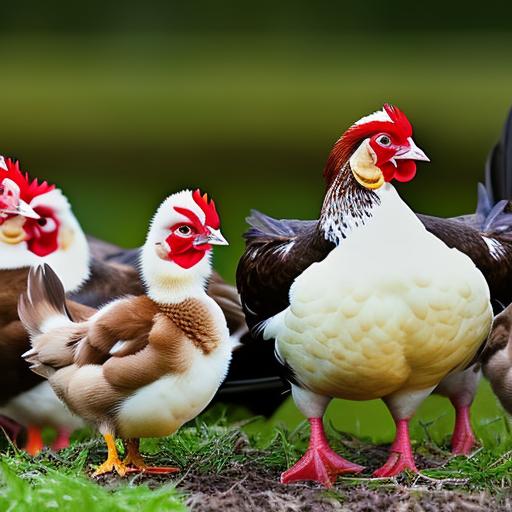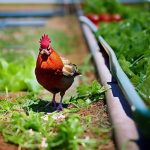Keeping chickens and Muscovy ducks together can be a rewarding and enjoyable experience for backyard poultry enthusiasts. Both chickens and Muscovy ducks are popular choices for small-scale farming and homesteading due to their ability to provide eggs, meat, and pest control. Personally, I have had the pleasure of raising both chickens and Muscovy ducks together on my own property, and I have found that they complement each other well in terms of their behaviors and benefits.
Key Takeaways
- Keeping chickens and Muscovy ducks together is possible and can be beneficial.
- Chickens and Muscovy ducks have different needs and behaviors that should be understood before keeping them together.
- Benefits of keeping chickens and Muscovy ducks together include pest control, egg production, and entertainment.
- Factors to consider before keeping chickens and Muscovy ducks together include space, predator protection, and compatibility.
- A suitable habitat for chickens and Muscovy ducks should include shelter, nesting boxes, and access to water and food.
Understanding the Differences Between Chickens and Muscovy Ducks
Before deciding to keep chickens and Muscovy ducks together, it is important to understand the differences between these two species. Physically, chickens are smaller in size compared to Muscovy ducks, with chickens typically weighing around 4-8 pounds while Muscovy ducks can weigh up to 15 pounds. Chickens have feathers that are more compact and fluffy, while Muscovy ducks have larger feathers that are more spread out.
In terms of behavior, chickens are known for their scratching and pecking habits, while Muscovy ducks are more inclined to forage and explore. Chickens tend to be more social and enjoy being in a flock, while Muscovy ducks are more independent and may prefer to roam on their own or in pairs. Additionally, chickens are known for their egg-laying abilities, while Muscovy ducks are known for their brooding instincts and ability to hatch their own eggs.
Benefits of Keeping Chickens and Muscovy Ducks Together
There are several benefits to keeping chickens and Muscovy ducks together. One of the main benefits is mutual protection from predators. Chickens are known for their loud alarm calls when they sense danger, which can alert the Muscovy ducks to potential threats. In return, the Muscovy ducks’ larger size and territorial nature can help deter predators from approaching the flock.
Another benefit is companionship and socialization. Chickens and Muscovy ducks can form bonds and provide each other with company and entertainment. They can also learn from each other’s behaviors, such as foraging techniques or finding the best spots for dust bathing.
Keeping chickens and Muscovy ducks together can also lead to increased egg production. Chickens are prolific layers, while Muscovy ducks are known for their brooding instincts. By allowing the Muscovy ducks to hatch and raise their own ducklings, you can increase your flock size without having to purchase new chicks or ducklings.
Lastly, both chickens and Muscovy ducks are excellent at pest control in the garden. Chickens will scratch and peck at the ground, eating insects and other pests, while Muscovy ducks will eat slugs, snails, and even small rodents. This natural pest control can help keep your garden healthy and free from unwanted pests.
Factors to Consider Before Keeping Chickens and Muscovy Ducks Together
Before keeping chickens and Muscovy ducks together, there are several factors to consider. First, it is important to check local laws and regulations regarding poultry keeping. Some areas may have restrictions on the number of birds you can keep or specific requirements for coop design.
Space requirements are also an important consideration. Both chickens and Muscovy ducks require adequate space to roam and forage. Chickens typically need around 4 square feet of space per bird in the coop, while Muscovy ducks require at least 10 square feet per bird. Additionally, both species will benefit from access to a secure outdoor run or pasture area.
Compatibility of breeds is another factor to consider. Some chicken breeds may be more aggressive or territorial than others, which could potentially cause issues when kept with Muscovy ducks. It is important to choose chicken breeds that are known for their docile and friendly nature when keeping them with Muscovy ducks.
Lastly, potential health risks should be taken into account. Chickens and Muscovy ducks can carry different diseases and parasites, so it is important to practice good biosecurity measures and regularly monitor the health of your flock.
Preparing a Suitable Habitat for Chickens and Muscovy Ducks
Creating a suitable habitat for chickens and Muscovy ducks is essential for their well-being. The coop and run design should provide enough space for both species to move around comfortably. The coop should have separate nesting boxes for the chickens and Muscovy ducks, as they have different preferences for laying eggs. Additionally, roosts should be provided for the chickens to perch on at night.
Water and food sources should be easily accessible for both chickens and Muscovy ducks. Ducks require deeper water for bathing, so a shallow pool or pond should be provided in addition to regular waterers. Both species should have access to appropriate feed, with chickens requiring a balanced layer feed and Muscovy ducks needing a feed specifically formulated for waterfowl.
Fencing and predator-proofing are crucial to keep both chickens and Muscovy ducks safe from predators. Fencing should be secure and tall enough to prevent predators from entering the coop or run area. Additionally, predator-proofing measures such as burying wire mesh underground or using electric fencing can help deter predators.
Feeding and Nutrition for Chickens and Muscovy Ducks

Chickens and Muscovy ducks have different dietary needs, so it is important to provide them with appropriate feed and supplements. Chickens require a balanced layer feed that contains the necessary nutrients for egg production. They also benefit from additional calcium supplementation, such as crushed oyster shells, to support strong eggshells.
Muscovy ducks have different nutritional requirements compared to chickens. They require a feed specifically formulated for waterfowl, as their dietary needs are different from those of chickens. Muscovy ducks also benefit from additional greens and foraging opportunities, as they are natural foragers.
Both chickens and Muscovy ducks can benefit from free-ranging and foraging opportunities. Allowing them to roam and explore can provide them with additional nutrients from insects, grasses, and other natural food sources. However, it is important to supervise free-ranging time to ensure their safety and prevent them from damaging gardens or neighboring properties.
Health and Disease Prevention for Chickens and Muscovy Ducks
Keeping chickens and Muscovy ducks healthy requires regular monitoring and preventative measures. Common health issues for chickens include respiratory infections, parasites, and egg-related problems. Regular health checks, vaccinations, and proper biosecurity measures can help prevent these issues.
Muscovy ducks are generally hardy birds but can be susceptible to respiratory infections and parasites as well. They also require regular health checks and vaccinations to ensure their well-being. It is important to provide clean water sources for both chickens and Muscovy ducks to prevent the spread of diseases.
Managing the Behavior of Chickens and Muscovy Ducks
Managing the behavior of chickens and Muscovy ducks is important to maintain a harmonious flock. Chickens have a natural pecking order, which can sometimes lead to aggression or bullying within the flock. Providing enough space, resources, and distractions can help minimize these issues.
Mating and breeding behavior should also be managed appropriately. Muscovy ducks are known for their brooding instincts and may become aggressive or territorial during breeding season. It is important to provide separate nesting areas for the ducks to prevent conflicts with the chickens.
Training and socialization can also help manage the behavior of both chickens and Muscovy ducks. Chickens can be trained to come when called or to use specific areas for dust bathing. Muscovy ducks can be socialized to be more comfortable around humans and to follow basic commands.
Tips for Keeping Chickens and Muscovy Ducks Together
When introducing new birds to an existing flock, it is important to do so gradually and under supervision. This allows the birds to establish a pecking order and reduces the risk of aggression or injury. Providing enough space and resources for all birds can also help minimize conflicts.
Monitoring behavior and health is crucial when keeping chickens and Muscovy ducks together. Regularly observing their interactions, eating habits, and overall well-being can help identify any potential issues early on. This allows for prompt intervention and treatment if necessary.
Building a strong relationship with your birds is key to successful poultry keeping. Spending time with them, providing treats, and handling them gently can help build trust and make them more comfortable around you. This can also make it easier to manage their behavior and health.
The Joys of Raising Chickens and Muscovy Ducks Together
In conclusion, keeping chickens and Muscovy ducks together can be a rewarding and enjoyable experience. The benefits of mutual protection, companionship, increased egg production, and pest control make them a great combination for small-scale farming or homesteading. However, it is important to consider factors such as local laws, space requirements, breed compatibility, and potential health risks before getting started.
Creating a suitable habitat, providing appropriate feed and nutrition, practicing good health and disease prevention measures, and managing behavior are all essential for successful poultry keeping. By following these guidelines and building a strong relationship with your birds, you can experience the joys of raising chickens and Muscovy ducks together on your own property.
If you’re considering keeping chickens and Muscovy ducks together, it’s important to understand the dynamics between these two species. While they can coexist peacefully, there are certain factors to consider. To learn more about this topic, check out this informative article on Poultry Wizard titled “Can You Keep Chickens and Muscovy Ducks Together?” This article provides valuable insights into the compatibility of these two poultry species and offers practical tips for successfully raising them together.
FAQs
What are Muscovy ducks?
Muscovy ducks are a domesticated breed of duck that are native to South America. They are known for their unique appearance, which includes a red, fleshy face and a distinctive wattle.
What are the benefits of keeping chickens and Muscovy ducks together?
Keeping chickens and Muscovy ducks together can provide a number of benefits, including increased pest control, improved soil health, and a more diverse range of eggs and meat.
Can chickens and Muscovy ducks coexist peacefully?
Yes, chickens and Muscovy ducks can coexist peacefully as long as they are introduced to each other gradually and provided with enough space and resources.
What are the potential challenges of keeping chickens and Muscovy ducks together?
Some potential challenges of keeping chickens and Muscovy ducks together include the risk of disease transmission, competition for resources, and the potential for aggression between the two species.
What should I consider before keeping chickens and Muscovy ducks together?
Before keeping chickens and Muscovy ducks together, it is important to consider factors such as the size of your property, the availability of resources such as food and water, and the potential risks associated with disease transmission and aggression between the two species.
Meet Walter, the feathered-friend fanatic of Florida! Nestled in the sunshine state, Walter struts through life with his feathered companions, clucking his way to happiness. With a coop that’s fancier than a five-star hotel, he’s the Don Juan of the chicken world. When he’s not teaching his hens to do the cha-cha, you’ll find him in a heated debate with his prized rooster, Sir Clucks-a-Lot. Walter’s poultry passion is no yolk; he’s the sunny-side-up guy you never knew you needed in your flock of friends!







